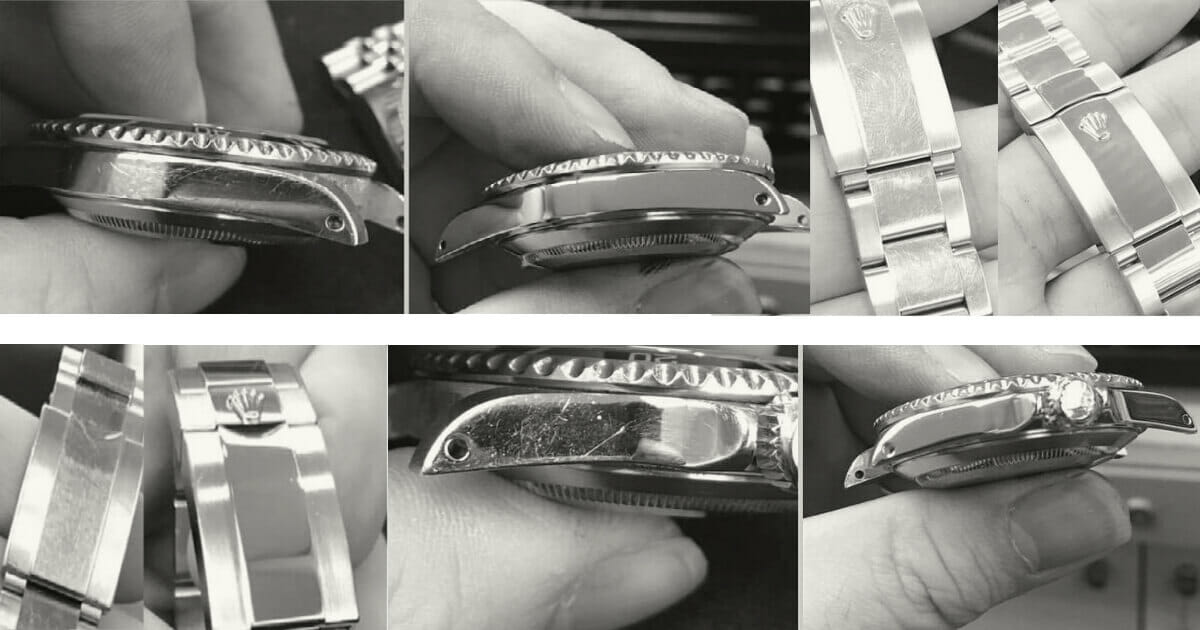Scratches on a watch are not just unsightly; they can also affect the watch’s value and functionality. Whether from daily wear or accidental scuffs, scratches can be quite a nuisance. Fortunately, there are several methods to diminish or even remove these blemishes.
In this article, we’ll guide you through the tools required and detailed steps for each method. Additionally, we’ll discuss the considerations for polishing and how to handle different surfaces on your watch.
Key Takeaways
- Scratch Removal Tools: Utilize tools like a soft microfiber cloth, non-gel toothpaste, metal polish, glass polishing compound, diamond paste, polishing pads, and a watch crystal polishing kit.
- Acrylic Crystal Scratch Removal: Apply non-gel toothpaste or metal polish with a soft cloth in circular motions, rinse, and dry.
- Mineral Glass Crystal Scratch Removal: Create a paste with a glass polishing compound, apply with a polishing pad in circular motions, then rinse and dry; or use a professional polishing kit.
- Sapphire Crystal Scratch Removal: Use diamond paste starting with the finest grain, polish gently, and move to coarser grains if necessary.
- Polished Surface Scratch Removal: Employ a gentle, high-grade polish applied with a soft cloth in light, circular motions.
- Brushed Surface Scratch Removal: Use a scotch-brite pad, rub in the direction of the grain with gentle, linear strokes.
- Considerations for Polishing: Polish sparingly to maintain the watch’s original contours and avoid over-polishing.
- Addressing Deep Scratches: For deep scratches, professional techniques may be necessary as polishing typically addresses only light scratches.
- Polishing Methodology: Polish smoothens the surface by gently abrading around the scratch, making it less noticeable.
Tools Required for Scratch Removal
- Soft microfiber cloth
- Non-gel toothpaste
- Metal polish (e.g., Brasso)
- Glass polishing compound (e.g., Cerium Oxide)
- Diamond paste
- Polishing pads
- Protective tape
- Watch crystal polishing kit

Methods for Scratch Removal
For Acrylic Crystals
- Toothpaste Method
- Apply a small amount of non-gel toothpaste to the crystal.
- Using a soft microfiber cloth, rub the toothpaste in a circular motion over the scratch.
- Rinse with water and dry thoroughly.
- Metal Polish Method
- Apply a small amount of metal polish to a soft cloth.
- Gently rub the cloth over the scratch in a circular motion.
- Buff the area until the scratch diminishes.

For Mineral Glass Crystals
- Glass Polishing Compound Method
- Mix a small amount of glass polishing compound with water to form a paste.
- Apply the paste to the scratch using a polishing pad.
- Rub the paste firmly in a circular motion, then rinse and dry.
- Professional Polishing Kits
- Use the abrasives in the kit sequentially according to the instructions.
- Polish the scratched area with each abrasive until the scratch is no longer visible.

For Sapphire Crystals
- Diamond Paste Method
- Apply a small amount of the finest micron diamond paste to the scratch.
- With a soft cloth, polish gently in a circular motion.
- Progress to coarser pastes if needed, then clean and buff.

Removing Scratches from Polished Surfaces
Polished surfaces require a gentle approach to maintain their shine while removing scratches. Use a finer abrasive like a high-grade polish or a specialized cream designed for polished surfaces. Apply with a soft cloth and use light pressure in a circular motion, then wipe clean.

Is Polishing My Watch a Good Idea?
Polishing should be done sparingly. While it can restore a watch’s luster, over-polishing can wear down the metal and alter the watch’s original contours. It’s a good idea for occasional refurbishment but not as a frequent maintenance routine.
How to Remove Scratches from a Stainless Steel Watch Case
Determine the Finish of the Scratched Surface
Polished Surfaces: Use a soft cloth and a gentle polish specifically for polished metal.
Brushed Surfaces: Employ a scotch-brite pad and rub in the direction of the grain to maintain the brushed look.
Removing Scratches from Brushed Surfaces
For brushed surfaces, match the original direction of the grain to avoid creating an uneven finish. Use gentle, linear strokes with the scotch-brite pad until the scratch blends with the rest of the surface.

Frequently Asked Questions
How do you remove scratches from a watch?
Scratches can be removed using different methods such as toothpaste for acrylic, glass polishing compounds for mineral glass, and diamond paste for sapphire crystals.
Can toothpaste remove scratches from stainless steel watch?
Toothpaste can be used to reduce minor scratches on polished stainless steel surfaces but may not be effective for deeper scratches.
What is the best scratch remover for watch glass?
The best scratch remover depends on the type of crystal. For acrylic, toothpaste or metal polish works well; for mineral glass, a glass polishing compound is best; for sapphire, diamond paste is recommended.
Does polishing a watch remove scratches?
Polishing can remove light scratches but may require professional techniques for deeper marks.
Does rubbing polishing remove scratches?
Rubbing polish over a scratch can help reduce its appearance but might not completely remove it, especially if it’s deep.
Why does polishing not eliminate scratches?
Polishing smoothens the surface by removing a fine layer of the material, but if a scratch is deep, polishing alone may not be enough to eliminate it.
What can I use to polish scratches?
Depending on the watch surface, you can use non-gel toothpaste, metal polish, glass polishing compound, specialized metal or watch polishes, or diamond pastes.
How does polish get rid of scratches?
Polish works by gently abrading the surface around the scratch to level it out and diminish its appearance, giving a more uniform finish to the material.
RELATED ARTICLES
HISTORY OF WRISTWATCHES: A COMPREHENSIVE TIMELINE YOU MUST KNOW
THE INTERESTING HISTORY OF ROLEX WATCHES
HOW TO FIX SCRATCHED GOLD PLATING ON A WATCH
HOW TO TELL IF A WATCH IS MAGNETIZED
- 15 Advantages of the Smartwatch - May 31, 2024
- What Are Smartwatches? : All you need to Know - May 29, 2024
- Antique Pocket Watches: A Comprehensive Guide - May 25, 2024

